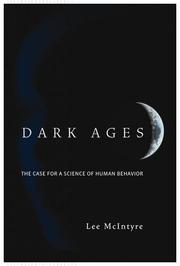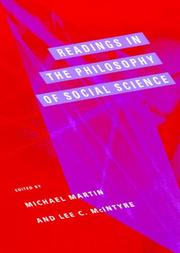| Listing 1 - 8 of 8 |
Sort by
|

ISBN: 1282097989 9786612097980 0262279517 1429416157 9780262279512 9781282097988 0262134691 9780262134699 9780262512541 0262512548 6612097981 9781429416153 Year: 2006 Publisher: Cambridge, Mass. MIT
Abstract | Keywords | Export | Availability | Bookmark
 Loading...
Loading...Choose an application
- Reference Manager
- EndNote
- RefWorks (Direct export to RefWorks)
Why the prejudice against adopting a scientific attitude in the social sciences is creating a new "Dark Ages" and preventing us from solving the perennial problems of crime, war, and poverty.
SOCIAL SCIENCE --- Sociology / General --- Social sciences --- Social Sciences --- Social Sciences - General --- Social sciences. --- Behavioral sciences --- Human sciences --- Sciences, Social --- Social science --- Social studies --- Civilization --- PHILOSOPHY/General --- Philosophy and psychology of culture --- Sciences sociales

ISBN: 0262631512 0262132966 9780262631518 Year: 1994 Publisher: Cambridge (Mass.): MIT press
Abstract | Keywords | Export | Availability | Bookmark
 Loading...
Loading...Choose an application
- Reference Manager
- EndNote
- RefWorks (Direct export to RefWorks)
Social sciences --- Philosophy. --- 3:165 --- Grondslagen van de sociale wetenschappen. Epistemologie van de sociale wetenschappen --- 3:165 Grondslagen van de sociale wetenschappen. Epistemologie van de sociale wetenschappen --- 303 --- 316.2 --- 303 Methoden bij sociaalwetenschappelijk onderzoek --- Methoden bij sociaalwetenschappelijk onderzoek --- 316.2 Sociologische richtingen. Sociologische scholen. Sociologen --- Sociologische richtingen. Sociologische scholen. Sociologen --- Social philosophy --- Social theory --- Philosophy --- Sciences sociales --- Philosophie --- Social sciences - Philosophy.
Book
ISBN: 9780262535045 0262535041 9780262345972 0262345978 9780262345989 0262345986 Year: 2018 Publisher: Cambridge, Mass. The MIT Press
Abstract | Keywords | Export | Availability | Bookmark
 Loading...
Loading...Choose an application
- Reference Manager
- EndNote
- RefWorks (Direct export to RefWorks)
"Are we living in a post-truth world, where "alternative facts" replace actual facts and feelings have more weight than evidence? How did we get here? In this volume in the MIT Press Essential Knowledge series, Lee McIntyre traces the development of the post-truth phenomenon from science denial through the rise of "fake news," from our psychological blind spots to the public's retreat into information silos. What, exactly, is post-truth? Is it wishful thinking, political spin, mass delusion, bold-faced lying? McIntyre analyzes recent examples--claims about inauguration crowd size, crime statistics, and the popular vote--and finds that post-truth is an assertion of ideological supremacy by which its practitioners try to compel someone to believe something regardless of the evidence. Yet post-truth didn't begin with the 2016 election; the denial of scientific facts about smoking, evolution, vaccines, and climate change offers a road map for more widespread fact denial. Add to this the wired-in cognitive biases that make us feel that our conclusions are based on good reasoning even when they are not, the decline of traditional media and the rise of social media, and the emergence of fake news as a political tool, and we have the ideal conditions for post-truth. McIntyre also argues provocatively that the right wing borrowed from postmodernism--specifically, the idea that there is no such thing as objective truth--in its attacks on science and facts. McIntyre argues that we can fight post-truth, and that the first step in fighting post-truth is to understand it"--
Philosophy and psychology of culture --- Science --- General ethics --- Truth --- Truthfulness and falsehood --- Truth. --- Truthfulness and falsehood. --- Vérité. --- Vérité et mensonge. --- Vérité. --- Vérité et mensonge.
Book
ISBN: 9401793646 9401793638 Year: 2015 Publisher: Dordrecht : Springer Netherlands : Imprint: Springer,
Abstract | Keywords | Export | Availability | Bookmark
 Loading...
Loading...Choose an application
- Reference Manager
- EndNote
- RefWorks (Direct export to RefWorks)
This volume follows the earlier successful book in the same series, which helped to introduce and spread the Philosophy of Chemistry to a wider audience of philosophers, historians, and science educators, as well as chemists, physicists and biologists. The introduction summarizes the way in which the field has developed in the ten years since the previous volume was conceived and introduces several new authors who did not contribute to the earlier book. The editors are well placed to assemble this book, as they are the editor in chief and deputy editors of the leading academic journal in the field, Foundations of Chemistry. The philosophy of chemistry remains a somewhat neglected field, unlike the philosophy of physics and the philosophy of biology. Why there has been little philosophical attention to the central discipline of chemistry among the three natural sciences is a theme that is explored by several of the contributors. This volume will do a great deal to redress this imbalance. Among the themes covered is the question of reduction of chemistry to physics, the reduction of biology to chemistry, whether true chemical laws exist and causality in chemistry. In addition more general questions of the nature of organic chemistry, biochemistry and chemical synthesis are examined by specialist in these areas.
Chemistry. --- History. --- Chemistry/Food Science, general. --- History of Science. --- Annals --- Auxiliary sciences of history --- Physical sciences --- Chemistry --- Philosophy.
Book
ISBN: 9780838917718 0838917712 Year: 2019 Publisher: Chicago, IL Society of American Archivists ALA Neal-Schuman
Abstract | Keywords | Export | Availability | Bookmark
 Loading...
Loading...Choose an application
- Reference Manager
- EndNote
- RefWorks (Direct export to RefWorks)
"A Matter of Facts: The Value of Evidence in an Information Age highlights the critical value of records and archives as sources of evidence: as vital tools for supporting human rights and enforcing public responsibilities across society"--
Information retrieval --- Philosophy of science --- Mass communications --- 930.25 --- 930.25 Archiefwetenschap. Archivistiek --- Archiefwetenschap. Archivistiek
Book
ISBN: 9780367871574 Year: 2019 Publisher: Abingdon Routledge
Abstract | Keywords | Export | Availability | Bookmark
 Loading...
Loading...Choose an application
- Reference Manager
- EndNote
- RefWorks (Direct export to RefWorks)
Book
ISBN: 9781119635222 9781119635239 9781119635246 Year: 2022 Publisher: Hoboken, N.J. Wiley Blackwell
Abstract | Keywords | Export | Availability | Bookmark
 Loading...
Loading...Choose an application
- Reference Manager
- EndNote
- RefWorks (Direct export to RefWorks)

ISBN: 9781402032561 1402032560 9781402032615 1402032617 9048168252 9786610612468 1280612460 Year: 2006 Volume: 242 Publisher: Dordrecht Springer
Abstract | Keywords | Export | Availability | Bookmark
 Loading...
Loading...Choose an application
- Reference Manager
- EndNote
- RefWorks (Direct export to RefWorks)
This comprehensive volume marks a new standard in scholarship in the still emerging field of the philosophy of chemistry. With selections drawn from a wide range of scholarly disciplines, philosophers, chemists, and historians of science here converge to ask some of the most fundamental questions about the relationship between philosophy and chemistry. What can chemistry teach us about longstanding disputes in the philosophy of science over such issues as reductionism, autonomy, and supervenience? And what new issues may chemistry bring to the forefront now that it has joined physics and biology as a serious topic for philosophical reflection? This newest addition to the prestigious Boston Studies in the Philosophy of Science series marks the true arrival of philosophy of chemistry within the corpus of the philosophy of science.
Theory of knowledge --- Philosophy of science --- History of chemistry --- Food science and technology --- voedingschemie --- voedingstechnologie --- epistomologie --- Chemistry --- Philosophy --- Philosophy. --- Science --- Chemistry. --- Philosophy of Science. --- Chemistry/Food Science, general. --- Philosophy and science. --- Physical sciences --- Science and philosophy
| Listing 1 - 8 of 8 |
Sort by
|

 Search
Search Feedback
Feedback About UniCat
About UniCat  Help
Help News
News